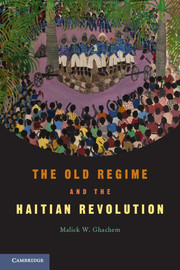Book contents
1 - Domestic Enemies
Published online by Cambridge University Press: 05 June 2012
Summary
[F]or that the whole world is full of Slaves, excepting certain countries in Europe (which since also by little and little receive them) it is needful here to reason of the power of Lords and Masters over their Slaves, and of the profits and disprofits which may redound unto a Commonwealth, if slavery should again be called into use: a question of great moment not for Families and societies only, but for all Commonwealths also in general.
– Jean Bodin, The Six Books of a Commonwealth (1606)The “power of Lords and Masters over their Slaves” is a classic topic of political theory, but the sources of the strategic (or commonwealth) ethics of slavery in Saint-Domingue do not lie in political theory alone. To be sure, some of these sources were indeed legal and intellectual in nature: the law of slavery (including ancient Roman antecedents), early modern French concepts of absolute sovereignty and private property, and the mythologies of racial hierarchy. Yet the brute forces of demography and geography also had their part, for they gave rise to the world of gaping racial “imbalances” and isolated settler and slave communities within which the formal letter of the Code Noir became practical law. All of these factors played a role in laying the groundwork for the kind of society that Saint-Domingue had become on the eve of the Haitian Revolution: a society divided not only by racial animosities between groups of different skin color, but also by conflicts that cut across racial lines and pitted certain colonial interests against others. The racialized power struggles that unfolded on the plantations were accompanied by internecine rivalries between imperial administrators and merchants, merchants and plantation owners, plantation owners and managers, and so forth.
- Type
- Chapter
- Information
- The Old Regime and the Haitian Revolution , pp. 29 - 76Publisher: Cambridge University PressPrint publication year: 2012

